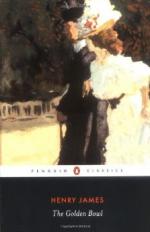XXXVII
Her father had asked her, three days later, in an interval of calm, how she was affected, in the light of their reappearance and of their now perhaps richer fruition, by Dotty and Kitty, and by the once formidable Mrs. Rance; and the consequence of this inquiry had been, for the pair, just such another stroll together, away from the rest of the party and off into the park, as had asserted its need to them on the occasion of the previous visit of these anciently more agitating friends—that of their long talk, on a sequestered bench beneath one of the great trees, when the particular question had come up for them the then purblind discussion of which, at their enjoyed leisure, Maggie had formed the habit of regarding as the “first beginning” of their present situation. The whirligig of time had thus brought round for them again, on their finding themselves face to face while the others were gathering for tea on the terrace, the same odd impulse quietly to “slope”—so Adam Verver himself, as they went, familiarly expressed it—that had acted, in its way, of old; acted for the distant autumn afternoon and for the sharpness of their since so outlived crisis. It might have been funny to them now that the presence of Mrs. Rance and the Lutches—and with symptoms, too, at that time less developed—had once, for their anxiety and their prudence, constituted a crisis; it might have been funny that these ladies could ever have figured, to their imagination, as a symbol of dangers vivid enough to precipitate the need of a remedy. This amount of entertainment and assistance they were indeed disposed to extract from their actual impressions; they had been finding it, for months past, by Maggie’s view, a resource and a relief to talk, with an approach to intensity, when they met, of all the people they weren’t really thinking of and didn’t really care about, the people with whom their existence had begun almost to swarm; and they closed in at present round the spectres of their past, as they permitted themselves to describe the three ladies, with a better imitation of enjoying their theme than they had been able to achieve, certainly, during the stay, for instance, of the Castledeans. The Castledeans were a new joke, comparatively, and they had had— always to Maggie’s view—to teach themselves the way of it; whereas the Detroit, the Providence party, rebounding so from Providence, from Detroit, was an old and ample one, of which the most could be made and as to which a humorous insistence could be guarded.
Sharp and sudden, moreover, this afternoon, had been their well-nigh confessed desire just to rest together, a little, as from some strain long felt but never named; to rest, as who should say, shoulder to shoulder and hand in hand, each pair of eyes so yearningly—and indeed what could it be but so wearily?— closed as to render the collapse safe from detection by the other pair. It was positively as if, in short, the inward felicity of their being once more,




